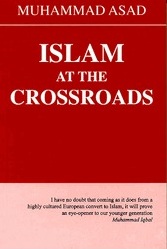 | |
| Author | Muhammad Asad |
|---|---|
| Language | English |
| Subjects | Politics, Religion, Muslim world |
| Publisher | Arafat Publications [1] |
Publication date | 1934 |
| Publication place | Pakistan, India |
| Media type | Print (Hardcover, Paperback) |
| Pages | 105 pp |
| ISBN | 9789839541045 |
Islam at the Crossroads is a book written by Muhammad Asad. The book originally published in Delhi and Lahore in 1934, and was later reprinted by Dar Al-Andulas in 1982 with an additional note by the author.
Contents
The book is basically a plea to Muslims to avoid blind imitation of Western social forms and values, and to try to preserve instead their Islamic heritage [2] which once upon a time had been responsible for the glorious, many-sided historical phenomenon comprised in the term "Muslim civilization". Asad dedicates the book to "the Muslim youth of today in hopes that it may be of benefit." [3]